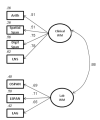A Comparison of Laboratory and Clinical Working Memory Tests and Their Prediction of Fluid Intelligence
- PMID: 20161647
- PMCID: PMC2818304
- DOI: 10.1016/j.intell.2008.11.005
A Comparison of Laboratory and Clinical Working Memory Tests and Their Prediction of Fluid Intelligence
Abstract
The working memory (WM) construct is conceptualized similarly across domains of psychology, yet the methods used to measure WM function vary widely. The present study examined the relationship between WM measures used in the laboratory and those used in applied settings. A large sample of undergraduates completed three laboratory-based WM measures (operation span, listening span, and n-back), as well as the WM subtests from the Wechsler Adult Intelligence Scale-III and the Wechsler Memory Scale-III. Performance on all of the WM subtests of the clinical batteries shared positive correlations with the lab measures; however, the Arithmetic and Spatial Span subtests shared lower correlations than the other WM tests. Factor analyses revealed that a factor comprising scores from the three lab WM measures and the clinical subtest, Letter-Number Sequencing (LNS), provided the best measurement of WM. Additionally, a latent variable approach was taken using fluid intelligence as a criterion construct to further discriminate between the WM tests. The results revealed that the lab measures, along with the LNS task, were the best predictors of fluid abilities.
Figures



References
-
- Ackerman PL, Beier ME, Boyle MO. Individual differences in working memory within a monological network of cognitive and perceptual speed abilities. Journal of Experimental Psychology: General. 2002;131:567–589. - PubMed
-
- Ackerman PL, Beier ME, Boyle MO. Working memory and Intelligence: the same or different constructs? Psychological Bulletin. 2005;31:30–60. - PubMed
-
- Ashcraft MH, Kirk EP. The relationship between working memory, math anxiety and performance. Journal of Experimental Psychology: General. 2001;130:224–237. - PubMed
-
- Baddeley AD. Working memory thought and action. Oxford University Press; Oxford, England: 2007.
-
- Baddeley AD, Gathercole SE, Papagno C. The phonological loop as a language learning device. Psychological Review. 1998;105:158–173. - PubMed
Grants and funding
LinkOut - more resources
Full Text Sources
Miscellaneous
